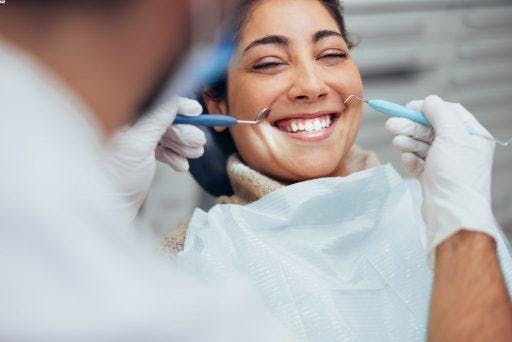Did you know only 53% of Australian adults brush their teeth twice a day? That’s according to the 2020 Oral Health Tracker from the Australian Dental Association. But you should know that diligent teeth care is essential for good dental health.
Neglecting your teeth care may eventually result in more problems for your smile. Save yourself from potential stress with these time-saving tips that fit seamlessly into a hectic lifestyle.
Teeth care tips for busy lifestyles

Here are fuss-free ways to keep your teeth healthy even when you’re busy.
1. Keep a dental kit with you.

A packed schedule may have you skipping important steps in your oral care routine. Of course, you wouldn’t want to enter a boardroom with morning breath or smile at a client only to have food stuck between your teeth. Give yourself peace of mind by keeping toothbrushes in strategic locations.
But don’t just stash your toothbrush with the stationary supplies. Find a travel pouch to store your dental goodies and make sure you wash them regularly. You can also keep a dental kit in your car’s glove compartment or office desk drawer.
2. Brush your teeth in the shower.
If you’re looking to save on daily prep time, consider brushing your teeth while you bathe. Pro tip – after applying conditioner to your hair, maximise your time by toothbrushing. While you leave the conditioner to soak, you can use those extra minutes for teeth-cleaning.
3. Consider an electric toothbrush.
In matters of teeth care, it isn’t just how many toothbrushes you have scattered around. If you’re looking to save time, consider an electric toothbrush. The rotating action of the bristles can remove plaque more effectively and shave seconds off your oral care routine. Can’t take your eyes off the clock? Opt for an electric toothbrush with a built-in timer to help you keep track of the time.
4. Use a mobile app.
If you prefer the fuss-fee usability of your good old manual toothbrush, maximise brushing by timing it. Download a dental app with a timer and other features to remind you to stay on top of your teeth care.
5. Consider using interdental floss.
It’s easy to forget to floss when you’re always in a rush, but overlooking this step puts your teeth care on the line. Plus, you get other health benefits from flossing regularly. Interdental floss can help remove any food particles between your teeth missed during brushing.
Keep a pack in your dental kit so you can make it to date night with a clean and fresh smile!
6. Don’t skip meals.

Skipping meals is bad news for your breath. Research from the International Journal of Dental Hygiene revealed that you are twice as likely to suffer from halitosis (bad breath) when you skip breakfast.
7. Eat healthy.
Yes, you can eat your way to better teeth care. Limit your intake of sugary or acidic foods. Go for high-calcium foods, like low-fat milk, yoghurt, cheese, and other dairy products to promote strong teeth and bones.
Crunchy fruits and raw vegetables, like celery, apples, and pears, can also help clean plaque and freshen your breath. If you’re always on the go, get your daily dose of glow foods to keep your teeth clean.
8. Drink more water.
Besides eating teeth-cleaning foods, load up on good old H20 to ensure your teeth care. Keeping your mouth (and yourself) hydrated can rinse away any leftover food particles and prevent bacteria from accumulating.
According to research from Pediatric Dentistry: Infancy Through Adolescence, drinking fluoridated water can help strengthen tooth enamel and prevent dental cavities. Too busy to brush your teeth after each meal or snack? Always have your reusable water bottle handy and sip more often.
9. Chew sugar-free gum.
No one likes the sound of loud mouth chewing, but in the name of teeth care, chewing gum could be just the answer for oral health care on the go. The American Dental Association recommends chewing sugar-free gum to increase saliva flow and stimulate taste receptors.
10. Avoid using home remedies.
While remedies like essential oils or a saltwater gargle may seem like quick fixes, they won’t be able to address specific dental conditions. They might even make matters worse. Always consult your dentist for proper medication to treat your problems, especially if you have persistent tooth pain or sensitivity.
11. Schedule dental checkups on a weekday.

Visits to your dentist may seem like an inconvenience with a schedule as busy as yours. But don’t wait until you have a serious concern before setting an appointment.
Find a dental clinic near your home or office and sneak in a visit in the middle of the week. Weekends and holidays are usually busier, so scheduling your appointment on a weekday may provide you with much-needed midweek respite. Book the first schedule of the day to avoid unforeseen delays, like when your dentist extends their time with the patient before you.
You can also request text reminders from your dentist’s secretary so you don’t forget an appointment. To avoid having to backtrack your dental history, prepare questions to ask and information to share with your dentist before your visit, especially if you’re seeing a new practitioner.
12. Cut down on caffeine and red wine.
Teeth whitening solutions can be expensive and time consuming. So why not prevent the need for it in the first place? Many things can stain your teeth, and consuming certain foods and drinks are one chief cause of teeth discolouration.
Coffee, tea, and wine contain high levels of chromogens, or pigments that stick to tooth enamel and make it look darker. Acidity can also wear on tooth enamel and make teeth appear yellow.
If you’re worried about boosting your energy level without caffeine, try natural waker-uppers like taking in some fresh air, working some movement into your break time, and drinking cold water.

13. Ditch the nicotine.
Nicotine and tar from smoking damage your tooth enamel and cause your teeth to yellow. Smoking also contributes to gum disease and other oral health concerns. Meanwhile, vaping also can contain colouring agents that affect your teeth.
14. Make teeth care time family time.
Healthy habits start at home, and you’ll find your kids eager to adopt them if you show you are committed to your own well-being.
Apart from teaching your kids to eat healthy and get active, try teaching them age-appropriate teeth care habits and techniques. Instead of overseeing their daily dental routine before your own, why not do it together? You’ll save time and ensure everyone’s doing their dental care the right way.
15. Choose time-saving orthodontic solutions.
If you are seeking orthodontic treatment but are too busy for frequent adjustments for metal braces, consider other time-saving approaches to fixing your teeth.
Lighten the load of your packed calendar with ClearCorrect dental aligners. They’re more discreet and comfortable, and they don’t require as many trips to the dentist. Because these are removable, your dental care routine will be quicker and easier than if you have braces.
You can take the online smile assessment to help determine if you’d be a good candidate for ClearCorrect.
Proper teeth care is crucial to maintaining dental health, so it’s important not to let it fall off your priority list. All it takes is a little adjustment to your hectic schedule and some creativity. Your best smile awaits!
References:
Abe, M., Mitani, A., Zong, L., Zhang, C., Hoshi, K., & Yanagimoto, S. (2021). High frequency and long duration of toothbrushing can potentially reduce the risk of common systemic diseases in late adolescence. Special Care in Dentistry, 42(3), 317–318.
Aggeborn, L., & Öhman, M. (2021). The effects of fluoride in drinking water. Journal of Political Economy, 129(2), 465–491.
Chewing gum. (n.d.). American Dental Association.
Kotronia, E., Brown, H., Papacosta, A., Lennon, L., Weyant, R. J., Whincup, P. H., Wannamethee, S., & Ramsay, S. E. (2021). Poor oral health and the association with diet quality and intake in older people in two studies in the UK and USA. British Journal of Nutrition, 126(1), 118–130.
López, D. V. T., Moral, P. Á. V., & Castro-Sánchez, M. (2020). Eating habits and their relationship to oral health. Nutrients, 12(9), 2619.
Pediatric Dentistry. (n.d.). ScienceDirect.
Rani, H., Ueno, M., Zaitsu, T., & Kawaguchi, Y. (2016). Oral malodour among adolescents and its association with health behaviour and oral health status. International Journal of Dental Hygiene, 14(2), 135–141.
State of Oral Health Equity in America 2022. (n.d.). CareQuest Institute for Oral Health.
The Australian Dental Association (n.d.). Teeth staining. teeth.org.au
The Australian Dental Association. (n.d.). ADA.
The Best Foods For A Healthy Smile and Whole Body | College of Dentistry | University of Illinois Chicago. (n.d.).
Toothbrushes. (n.d.). American Dental Association.
Weerakoon, Dr. Arosha (3 July 2023). What the Health: Is vaping bad for your teeth? The University of Queensland.



